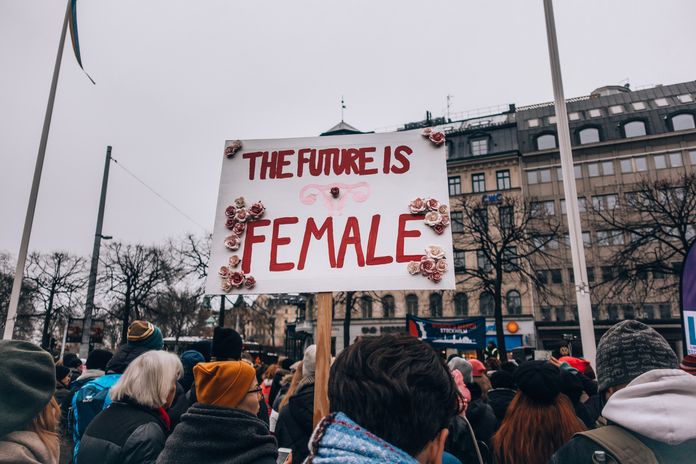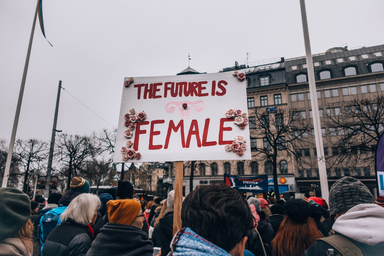Trigger Warning: mention of sexual assault
Disclaimer: This story touches on a personal experience in a classroom that talked about specific sexual assault alligations between men and women which is what I will be speaking on, using specific statistics. I stand with all survivors.

I have thought about the way I want to write about this piece a lot. The angle I would take, how much or how little I say, and what theme I wanted throughout.
But I realized that was the problem. I was putting pressure on myself to write a perfect piece about a terrible experience. As a writer, I am used to expressing things through words and articles, and I truly love doing that. But sometimes I don’t have to be the professor and I am allowed to write a piece that just shares my experiences as a student.
I am part of the small percentage of women in my sports journalism class. As I grow, that number won’t necessarily change, since this field is historically and currently dominated by men.
It was a really cloudy day, the rain was on and off and my stomach was filled with anxiety. I knew that based on how prior classes had gone, watching Athlete A (a documentary about Larry Nassar’s sexual abuse of young gymnasts), this would not be a easy class.
I didn’t want to talk a lot in this class, since it had felt like anytime there was a topic about women in the industry, it was up to me and my other female classmate to talk about it. This issue is too big and too important to let men ignore and I wasn’t going to let them get off silently.
But I cracked. I heard too many things I didn’t agree with and my mind began to crumble. My voice trembled and a combination of passion, anger, sadness, and energy was the driving force behind the “speech” I gave. My point was that these situations exist everywhere.
I soon realized that I was talking to a class of men. After hearing supportive messages from a select few, I felt so small. I was nothing to them. My voice did not want to be heard, and if it was, it was quickly flushed out of their memory.
That day and that class will never be flushed out of mine.
But neither will the other class that had a similar topic to discuss.
The chapter of the book we had to read that day was called Rooting for Your Team When the Star Is Accused of Domestic Violence. I had similar expectations to the other class we had when sexual assault came up. But I didn’t think it could get any worse.
“Innocent until proven guilty.”
“Innocent until proven guilty.”
“Innocent until proven guilty.”
That is all I heard. Or instead it was.
“How do I know these women aren’t lying, I don’t know them.”
It was more important for my male peers to protect NFL football player DeShaun Watson than it was to believe women. It was an utter refusal to believe that these women could be telling the truth and if they were, it was up for the court to decide that.
“The court,” they said. The criminal justice system that doesn’t protect survivors most of the time is not the deciding factor in cases of sexual assault. But to them it is. To put trust in a system that fundamentally fails to protect women, and survivors of sexual assault before you can put trust in the women themselves is never trusting them at all. To only trust survivors and women who come forward that you know directly, is not ever trusting them.
I asked my male peers to change their perspective. To think about if their sister came to them, what would they say. Would they respond “that man is innocent until proven guilty.” Of course they wouldn’t. They looked at me like I was crazy. They shamed me, and made me feel wrong for asking.
Once again, for debunking their sexism and for pulling apart the toxic and harmful language they used, I was somehow the one in the wrong. I was the one that needed to “chill,” for standing up and speaking out against sexual assault and the cycle that allows it to reoccur time and time again.
It was suffocating. It was harmful. It shrunk. I was now the woman who was angry, I was now the woman who was emotional. I was exactly who they wanted me to be. I showed they got to me.
I said at the beginning I wouldn’t be providing a teaching lesson and instead just sharing my experience. But I can’t hold back. To those who are reading this and may agree with the points made by my male classmates, think about this.
If it’s not your sister, it’s your aunt, your favorite teacher in high school, your grandmother, her best friend, the friends you made at school, your favorite staff member at a store. It could be your cousin, your family friend, someone who made a huge impact on your life, or it could be someone you admire on Twitter.
The common theme among every woman who is a survivor of sexual assault is that they are women. They are abused time and time again by a system and by men because of their gender. It’s not the clothes they wear, or the alcohol they drink.
Why is it any different when you don’t know them?
I felt small, and my tears blurred the Zoom screen but I knew I was right. I will never apologize for standing up for me, my gender, my place in the sports industry and for surviors of sexual assault everywhere.
The sports industry is powered by men. My sports journalism classes are dominated by them too. I am one voice, one person and one woman. Uplift each other and amplify those who are silenced.
Believe women. All women.




